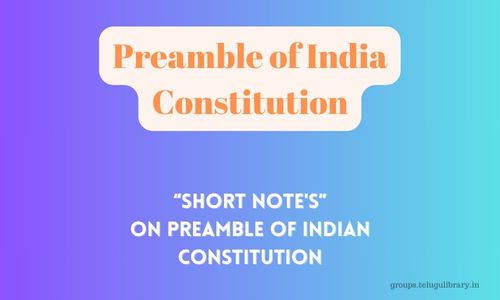Preamble of India Constitution…
The preamble of Indian constitution
Importance of preamble:
the Preamble is important because it encapsulates the core values, intent, and guiding principles of a constitution, providing inspiration, direction, and a reference point for both citizens and the government.
Short note on preamble of Indian constitution
The Preamble of the Indian Constitution is a concise introductory statement that outlines the fundamental values, objectives, and aspirations of the Constitution. It serves as the guiding philosophy and spirit of the Constitution. The Preamble of the Indian Constitution declares:
- Sovereign: India is a sovereign nation, which means it has full authority over its own affairs and is not subject to the control of any external power.
- Socialist: India is committed to achieving a socialist society, emphasizing social and economic equality and the equitable distribution of resources.
- Secular: The Indian state is secular, meaning it treats all religions equally and does not endorse or promote any particular religion. It guarantees religious freedom and ensures a separation of religion from the state.
- Democratic: India is a democratic republic, where the power to govern is derived from the people through free and fair elections. It upholds the principles of political pluralism and majority rule.
Preamble of India Constitution…
- Republic: India is a republic, with an elected head of state (the President) rather than a hereditary monarch. The people have the ultimate authority to choose their leaders.
- Justice: The Preamble emphasizes the importance of justice, which includes social, economic, and political justice. It aims to create a just and equitable society for all.
- Equality: The Preamble highlights the commitment to ensuring equality of status and opportunity to all citizens, regardless of factors such as caste, religion, gender, or place of birth.
- Fraternity: The Preamble calls for promoting a sense of brotherhood and unity among all citizens, transcending any divisions or differences.
The Preamble is not enforceable in a court of law, but it reflects the ideals and values that the Indian Constitution aspires to uphold. It acts as a moral and ethical compass for the country and has been a source of inspiration and guidance for the nation since the adoption of the Indian Constitution on January 26, 1950.
Socialist meaning in preamble:
In the Preamble of the Indian Constitution, “socialist” means a commitment to reducing economic inequalities, ensuring social and economic justice, and promoting the welfare of all citizens, although it doesn’t strictly adhere to any specific socialist ideology.
Is preamble part of constitution?
Yes, the Preamble is considered an integral part of the Indian Constitution. While it is not a substantive or enforceable provision in the way that the articles and schedules of the Constitution are, the Preamble serves as an introductory statement that outlines the fundamental principles, values, and objectives of the Constitution. It sets the tone and provides the guiding philosophy for the Constitution, and it has been relied upon by the judiciary in interpreting the Constitution’s provisions.
Preamble of India Constitution…
who proposed the preamble before the drafting committee of the constitution?
The Drafting Committee appointed by the Constituent Assembly of India, with Dr. B. R. Ambedkar as its chairman, drafted and proposed the preamble of the Indian Constitution. The Constituent Assembly adopted the Preamble on January 22, 1947, outlining the Constitution’s objectives and ideals. It commences with the phrase “We, the people of India” and articulates the key principles and goals of the Indian state, including justice, liberty, equality, and fraternity.
Preamble type:
In short, there are several types of preambles in constitutions, including those that state objectives, identity, history, faith, aspirations, or a mix of these elements. Preambles serve to introduce and express the fundamental values and goals of a constitution and can vary significantly between different nations.
Indian constitution New challenges Notes With Questions and Answers
“Distinctive Features of Indian Federalism: Student-Friendly Question & Answers”
What are Fundamental Duties class 9-Question and Answers
What do you mean by Directive Principles of State Policy?
Understanding Fundamental Rights in the Indian Constitution – Exam Study Material
“Tribute to Sarvepalli Radhakrishnan: The Philosopher-President Who Shaped India’s Future”
What is India’s uniform civil code? History of Uniform Civil Code India and Questionnaire
